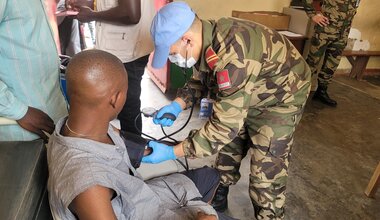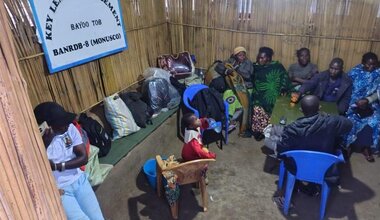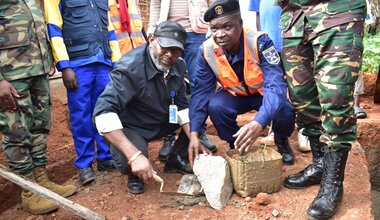Ituri: MONUSCO provides the National Human Rights Commission with modern office space
"Before, we had a very small room within the premises of a community radio station where we were suffocated, with five people stuck in a very small room. Imagine the climate in which we could work. During the Covid-19 period, only two people could stay in that small room. Understand what we had been through for five years”.
Thus spoke Marie Pacuriema, the provincial coordinator of the National Human Rights Commission (CNDH) in Ituri, during the handing over by MONUSCO of a modern building destined to house the headquarters of the CNDH, an institution dedicated to promoting and protecting human rights.
On 13 June, the MONUSCO head of office in Bunia handed over to the provincial governor of Ituri, General Johnny Luboya Nkashama, the first new building for the provincial coordination of the National Human Rights Commission, funded by the Joint United Nations Office for Human Rights to the tune of 46,992 USD.
The ceremony took place in the presence of the president of the National Human Rights Commission, Mwamba Mushinkoke Mwamus, who specially had come from Kinshasa. He took the opportunity to thank the military governor of Ituri who had made this MONUSCO Quick Impact Project (QIP) possible by making a piece of land available to the provincial coordination of the CNDH. The United Nations Joint Human Rights Office (UNJHRO) of MONUSCO in Bunia did the rest: constructing and equipping this building, which will now allow the CNDH Provincial Coordination to have an address and therefore to be visible
The new CNDH building in Ituri is 120 square metres. It has a 28 square metre conference room, five offices, two toilets and is equipped with computer equipment and office furniture.
Strengthening respect for human rights
General Johnny Luboya Nkashama, the military governor of Ituri, welcomed the project. It is "maybe a small project for MONUSCO, but a very big one" for the province, he said. "The state of siege represents first and foremost the presence of the State. And the building being offered today to the CNDH is an illustration of this. Human rights constitute a bridge which allows us to gain the trust of the population. That is why I say that this project is a great project; it shows the population that we are supported", he explained.
With this building, it is above all the work of the provincial coordination of the CNDH/Ituri which will radically change and improve, according to Marie Pacuriema, the provincial coordinator of this structure.
"Now, our working conditions are going to change, we are going to open us up to the world because we will now have visibility. This visibility will contribute a lot, because we work a lot with the population. From now on, when someone wants to see us, they know where to find us," she said.
Much remains to be done
The CNDH is not short of work. Ituri, a province under a state of siege for thirteen (13) months, has been experiencing armed conflict since 2017, with its share of atrocities and human rights abuses. For the president of the CNDH, progress has been made in Ituri with regard to the human rights situation, but much remains to be done.
"There is a difference of perception regarding respect of human rights in Ituri. When you are in Kinshasa, with what you hear on the airwaves, and when you are on the ground, you experience the reality on the ground, there is a difference. The truth is that, in light of the previous reports, the situation was very worrying. But the information I have received from actors and stakeholders in the protection of human rights since I have been in Bunia is that there has been an improvement. There is positive progress, but much remains to be done," he said.
For him, this support from MONUSCO reflects "the good relationship" that the CNDH has always had with the UNJHRO. "This is not the first piece of work by MONUSCO. Since 2015, we have received several types of support: financial, technical, etc.," he said.
The CNDH was created by the law of 21 March 2013. It is responsible for the promotion and protection of human rights in the Democratic Republic of Congo and is also the government's advisor on all human rights issues. The CNDH also has the following missions:
- to investigate all cases of human rights violations;
- to guide complainants and victims and help them to go to court for all proven human rights violations;
- to carry out periodic visits to penitentiary and detention centres throughout the country;
- to ensure that the rights of women and children are respected or that the rights of people with disabilities are respected.
It must also develop networks with public and private organisations that pursue the same human rights objectives. It is in this context that it collaborates closely with the UNJHRO, which supports it on an ongoing basis.
Examples of such support include:
- the donation of former MONUSCO offices to the CNDH's provincial offices in Lubumbashi and the Kasai; - capacity building for CNDH staff at both national and provincial levels;
- donations of equipment and the construction of the building housing the CNDH's provincial office in Kalemie in Tanganyika.

 UN
UN United Nations Peacekeeping
United Nations Peacekeeping






